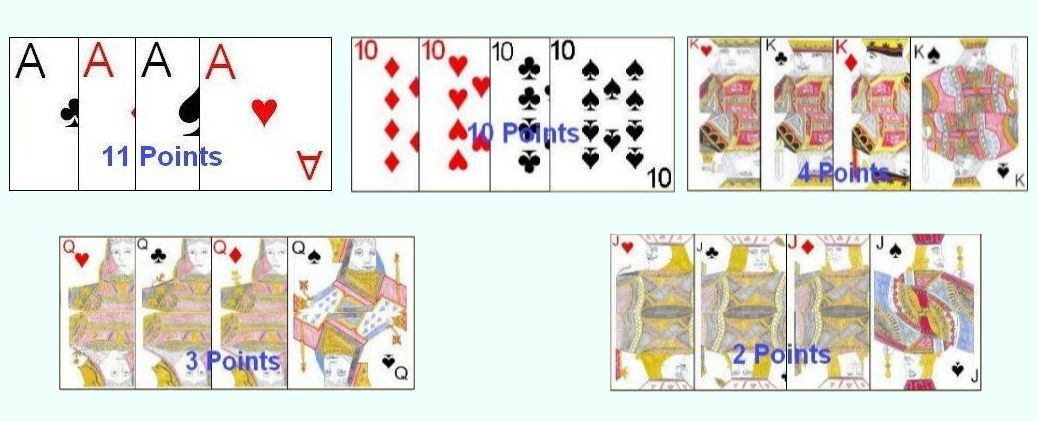- Frog:
When Frog is declared, the suit of Hearts is always trump for the hand. The bidder takes the three card widow into his hand and must then discard any three cards from his hand face down to the table. Any card points found in the three discarded cards are added to the bidders total at the end of the hand. If the bidder manages to capture 60 or more card points during the hand, he collects 1 chip from each opponent for each point above 60 he manages to capture. However, if he is unable to capture at least 60 card points, he is penalized one chip to each player for each point below 60 he did manage capture. If the bidder captures exactly 60 points no chips are exchanged.
|

|
- Chico:
This "game" is similar to Frog, but the bidder must name a trump suit of Spades, Clubs or Diamonds. The bidder does not look at the widow hand, take the widow cards into his hand or make any discards. However any point scoring cards found in the widow hand are added to those the bidder captures. For each card point the bidder captures above 60, he collects two chips from each other player. For each card point below 60 his total is, he must pay two chips to each other player. For capturing exactly 60 card points, the bidder does not lose or collect any chips.
|

|
- Grand:
When playing Grand, Hearts is always the trump suit used for the hand. The bidder does not look at or take the widow cards into his hand, but any high card points found in it are added to his card points earned during the hand. For each card point the player is able to capture above 60, he earns 4 chips from each other player. For each point his total captured card points is below 60 however, he must pay 4 chips to each opponent. A card point total of exactly 60 results in no chips being lost or collected.
|

|
In every other respect, Frog is played the same as Six Bid Solo.
Copyright © 2015 CatsAtCards.com. All rights reserved.

 Once the initial dealer is determined he then shuffles the deck and offers it to the player to his right for the cut.
After the cut, the dealer then begins dealing the cards to each player, in small face down packets, in a clockwise direction, starting with the player to his immediate left.
This dealing occurs in a number of rounds until each player has the requisite 11 cards needed for the hand.
The dealer starts with a packet of 4 to each player. He then distributes a packet of 3 to each player and then deals a three card widow hand, face down to the middle of the table. Lastly he delivers a 4 card packet to each player to complete the deal for the hand.
Once the initial dealer is determined he then shuffles the deck and offers it to the player to his right for the cut.
After the cut, the dealer then begins dealing the cards to each player, in small face down packets, in a clockwise direction, starting with the player to his immediate left.
This dealing occurs in a number of rounds until each player has the requisite 11 cards needed for the hand.
The dealer starts with a packet of 4 to each player. He then distributes a packet of 3 to each player and then deals a three card widow hand, face down to the middle of the table. Lastly he delivers a 4 card packet to each player to complete the deal for the hand.


 Once the last card of the hand is played to a trick, the widow hand is then added to the cards the bidder captured in tricks during the hand. The bidder then looks through all these cards and adds the total in card points he managed to capture during the hand to help determine if he was able to fulfill his contract.
In the "games" that required the bidder to lose all tricks (Misere and Spread Misere) the player must win no tricks in order to fulfill his contract.
As indicated previously, the traditional method of scoring in Six Bid Solo is to use chips, with the player earning chips from each other player or losing chips to each other player, depending on if he is able to fulfill his bid contract.
After a set number of deals, the game usually ends, with the player having the most chips considered the winner. Also, if any player pays his last chip, the game also ends, with the remaining player with the most chips considered the winner.
Once the last card of the hand is played to a trick, the widow hand is then added to the cards the bidder captured in tricks during the hand. The bidder then looks through all these cards and adds the total in card points he managed to capture during the hand to help determine if he was able to fulfill his contract.
In the "games" that required the bidder to lose all tricks (Misere and Spread Misere) the player must win no tricks in order to fulfill his contract.
As indicated previously, the traditional method of scoring in Six Bid Solo is to use chips, with the player earning chips from each other player or losing chips to each other player, depending on if he is able to fulfill his bid contract.
After a set number of deals, the game usually ends, with the player having the most chips considered the winner. Also, if any player pays his last chip, the game also ends, with the remaining player with the most chips considered the winner.


